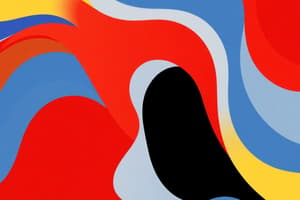Podcast
Questions and Answers
What HTML element is used to create a table?
What HTML element is used to create a table?
table
A table can only display text data.
A table can only display text data.
False (B)
Which attribute is used to cover several columns in a table cell?
Which attribute is used to cover several columns in a table cell?
- rowspan
- colspan (correct)
- span
- cellspacing
What is the purpose of table headings?
What is the purpose of table headings?
What is deprecated styling for tables in HTML5?
What is deprecated styling for tables in HTML5?
Using tables for layout is considered semantic.
Using tables for layout is considered semantic.
What was a popular usage of tables in the 1990s?
What was a popular usage of tables in the 1990s?
List two kinds of spacing attributes for tables.
List two kinds of spacing attributes for tables.
Flashcards are hidden until you start studying
Study Notes
Introducing Tables
- An HTML table is a grid of cells.
- The
<table>element is used to create a table. - Tables can display various content like calendars, financial data, lists, images, text, links, and other tables.
The Death of Marat Table
- Each HTML table contains rows (
<tr>) and cells (<td>). - The
<td>elements go inside the<tr>tags. - Content goes inside the
<td>tags.
Why Using Table Headings is Important
- Using the
<th>element for table headings:- Makes the content within the element bold.
- Helps with accessibility (screen readers).
- Provides semantic information about the row being a header row.
Spanning Rows and Columns
- To cover multiple columns or rows with a single cell you can use the
colspanandrowspanattributes.
Table Layout Considerations
- Using tables for page layout was popular in the 1990s, but is now discouraged for many reasons:
- It can lead to "table bloat," where the HTML code becomes unnecessarily complex.
- It is not semantic, meaning the markup does not accurately reflect the content's structure.
- This can often result in larger HTML files.
- Browsers can handle table layouts differently, leading to inconsistencies.
Additional Table Tags
- The following table tags are used for various purposes:
<caption>is used to define a caption for the table.<thead>defines the table header.<tbody>defines the table body.<tfoot>defines the table footer.
Styling Tables
- You can style tables with CSS.
- Although legacy HTML attributes for styling tables still exist, they are deprecated:
widthfor setting cell width.heightfor setting cell height.cellspacingto add space between cells.cellpaddingto add space between cell content and its border.bgcolorto change the background color of any table element.backgroundfor adding a background image.alignfor aligning the table in relation to its container.
Styling Tables with Borders
- CSS makes it easy to create borders around tables and individual table cells.
Styling Tables with Padding and Spacing
- You have full control over padding and spacing within tables and table cells using CSS.
Nth-Child Selectors
- CSS
nth-childselectors enable interesting styling tricks for tables, such as hover effects and zebra stripe patterns.
Studying That Suits You
Use AI to generate personalized quizzes and flashcards to suit your learning preferences.




